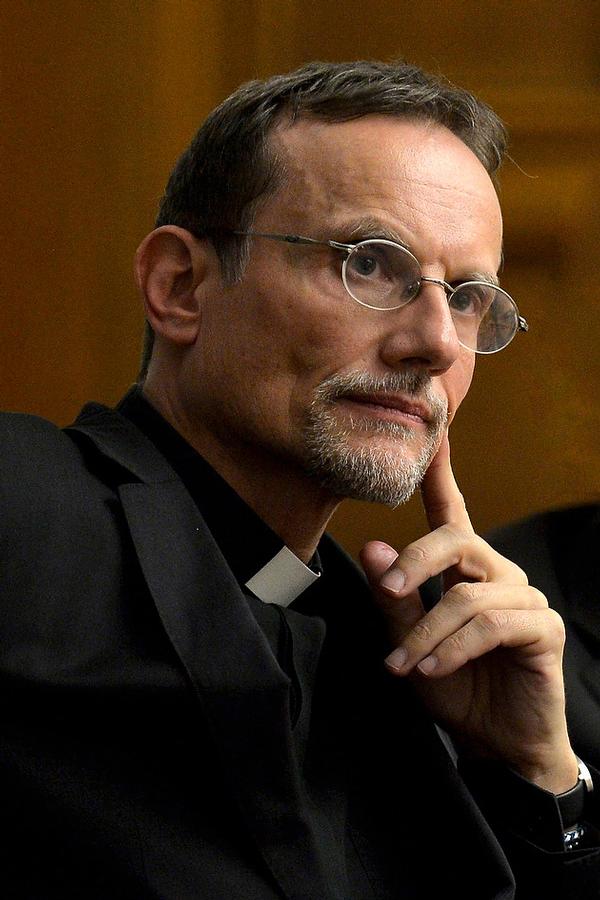- Home
- La Gregoriana
- 60 - Synod 2021-2024 | Walking Together
- Ecumenical Studies, an opportunity for growing together
Share:

Studying the various Christian traditions is important; but studying them together is moving into a higher gear. The new Licentiate will allow students and professors belonging to the different Christian denominations to interact during a variety of two-voice seminars, and residential trips abroad
The Licentiate in Theology offers a new specialisation, whereby Catholic students and students belonging to other Christian traditions will have the opportunity to study together, side by side, under the guidance of professors representing diverse Christian denominations. Starting in the Academic Year 2022-2023, the Faculty of Theology of the Pontifical Gregorian University is offering a new Licentiate in Theology with a specialisation in Comparative Theology of Christian Traditions and Ecumenical Studies. This two-year course aims to provide a solid and comprehensive platform for the study of the theological traditions of Christian denominations, while fostering the creation of an ecumenical dialogue network within the Faculty.
The innovative trait of the academic programme can be found also in its methodology, notably that of a “university that goes forth” towards the encounter with our fellow others by means of shared studies and innovative “experience-courses.” “The preparatory phase was received very favourably, marked by a yearning - I would even say enthusiasm - to cooperate on the part of Professors belonging to other Christian traditions,” observed Fr. Philipp G. Renczes S.J., Dean of the Faculty of Theology. “It is a sign of the high regard enjoyed by the Gregoriana also outside the Catholic world.”
The new Licentiate’s designation is twofold, so to speak: it is referred to as “Comparative Theology of Christian Traditions” and “Ecumenical Studies.” Why?
“The expression ‘Comparative Theology of Christian Traditions’ refers to the specific methodology of this Licentiate, which is to expand the study of various Christian traditions by way of comparison and mutual exchanges in an academic environment that offers a space of freedom along with the privilege of discovering unknown or previously uncharted grounds.
The expression “Ecumenical Studies” refers to the Gregorian University’s tradition of encouraging and promoting ecumenical encounters, with the purpose of working towards renewed unity inside the Church.”
In what way does this new Licentiate form part of the Faculty of Theology’s academic offering?
“The Licentiate is anchored in the Department of Dogmatic Theology, but it will also draw on the academic offerings of the other Departments - Biblical Theology, Fundamental Theology, Moral Theology - including the Department of Patristic Theology and Tradition of the Fathers to deepen the study of Church theology before the great schisms that define Christianity today. Studying the patristic era is of great importance. The panel of professors who developed this project - Michelina Tenace, Etienne Vetö, Keith Pecklers and William Henn, as well as myself - has played an important role in surveying the roots whence the various Christian denominations developed. Furthermore, as far as Eastern Christianity is concerned, we shall be working in close cooperation with the Pontifical Oriental Institute.”
But the courses will be taught also by non-Catholic professors. Nor will all the students be Catholic. How do you plan to work together?
“I believe that the strength and true novelty of this course will be precisely the fact of studying together. A Christian denomination other than one’s own is already studied in many academic institutions, but our intention is for students from the three major Christian denominations - Catholic, Orthodox and Reformed – to study together and for an extended period of time, i.e. for the duration of a Licentiate programme. Studying the works of other traditions together with those having first-hand understanding of them, or together with those who discover our texts and ask us new questions, is a very different approach.”

Likewise, the fact that the faculty members of the same seminars belong to different traditions makes a big difference. The professors serving on the panel have cultivated long-standing relationships with scholars from other Christian traditions, and this has enabled us to develop a programme that draws on the close collaboration among non-Catholic professors. The “two-voice seminars" - the cornerstone and heart of this Licentiate programme - will be taught by a Catholic professor together with a professor from a different Christian denomination. Learning together, expressing elements of agreement and sometimes disagreement in a dialogic approach, effectively helps students gain insight into the different traditions.”
In parallel to this marked focus on the seminars, requiring a restricted number of participants, there are also “experience courses.” What do they involve?
“Our wish was to combine the Professors from different Christian denominations’ expertise in the various fields of relevance for theology and for the life of the Church, with the real-life experience of in-depth learning and enrichment through mutual exchanges. We therefore came up with the idea of experience-courses, i.e., a few-days’ residential trip to seminaries or academic study centres of other Christian denominations. A different residential trip will be offered each year - alternating between Orthodox and Reformed-majority countries - so that during the two-year Licentiate each student will have the opportunity to experience both, giving rise to new relations and friendships. We hope to expand the university network over time. We dream of a generation of theologians being formed together, who can continue working together over the years. I am sure that this will contribute significantly to the renewal of theology per se and to growing unity inside the Church.”

